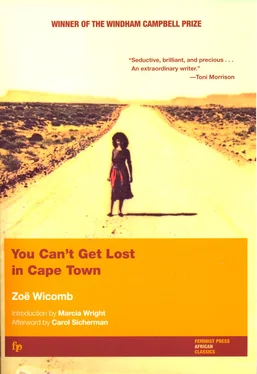Zoë Wicomb
You Can't Get Lost in Cape Town
Although You Can’t Get Lost in Cape Town , Zoë Wicomb’s portrait of a young coloured 1woman’s coming to age in apartheid-ruled South Africa, spans the mid-1950s to the mid-1980s, this episodic novel is not a period piece. Indeed, to grasp the complex consciousness of those known in the twentieth century as the Cape Coloured people, one must reach back not just fifty years, but to a time far anterior to apartheid. What is more, this portrayal of one young woman’s life and expanding awareness is highly relevant to the present, when the struggle in South Africa is defined not by race-led laws but rather by class aspirations and economic disadvantages that carry forward a history of vulnerability.
Wicomb’s protagonist, Frieda Shenton, and her immediate family resolutely defy easy categorization, even when the characters themselves indulge in stereotyping. The Shentons are exceptional among coloured people in Little Namaqualand, an impoverished, semiarid area beyond the rich wheat farms and vineyards north of Cape Town. With respect to their neighbors, the Shentons are well educated and, invested in social improvement, proud of their growing command of the English language and of their patrilineal name-giver, a Scot. Frieda’s father, a primary school teacher, is recognized as a local notable, above the “commonality,” while Frieda’s mother has something more equivocal in her identity: Griqua parentage. 2Mrs. Shenton has embraced the ideal of the “lady” and continually warns her daughter against compromising behavior. The young and then mature Frieda must cope with and transcend essentially conservative anxieties that feed the stereotypes purveyed by her mother, which reveal a perspective prevalent among the coloured petty bourgeoisie. In telling Frieda’s story, Wicomb explores class, race, gender, and culture across a wide register.
LITTLE NAMAQUALAND
The social arena in Little Namaqualand into which Frieda is born encompasses a confusing array of identities. These identities fall short of being ethnicities, that is, coherent groups claiming a common ancestry. Rather, individuals carry or are assigned identities that may be fragments of their ancestry but bespeak stereotypical behaviors or features. A preliminary understanding of the roots of these various identities will enrich appreciation for Wicomb’s work, which restores coloured experience and history as it contextualizes, revises, and humanizes it. Wicomb does this on a personal scale, bringing forth characters who — albeit in sometimes oblique ways — comment on, align themselves with, or represent various indigenous and settler groups, ranging from the indigenous Namaqua to the coloured Griqua to the white Boers and British. You Can’t Get Lost in Cape Town depicts not only the strong cultural hold of these identities but also their limits and shifting nature, as well as the painful history of colonization, displacement, and apartheid that accompanies them.
The Namaqua of Namaqualand were among the groups of Khoikhoi, the indigenous African pastoralists encountered by the Dutch in their initial settlements at the Cape in the mid-seventeenth century. By the middle of the nineteenth century, the Namaqua group of Khoi had yielded to the incoming Basters (literally meaning hybrid ), mixed-race groups of frontierspeople. 3The absorbed Namaqua surface in Wicomb’s work through Skitterboud, the servant who figures in “A Fair Exchange.”
Of all these mixed-race frontierspeople, by far the most prominent were the Griqua, a group substantially involved in the nineteenth-century northward extension of Cape colonial culture. In the early 1800s, patriarchally led settlements of Basters moved north of the Orange River, beyond the limits of the Cape Colony, where they exercised greater political autonomy while seeking to maintain their economic and cultural ties to the Cape Colony. The name Griqua was adopted at one of the key settlements, Klaarwater, renamed Griquatown “because, ‘on consulting among themselves they found a majority were descended from a person of the name of Griqua’, that is, from the eponymous ancestor of the Khoikhoi clan, the /Karihur (‘Chariguriqua’).” 4The Griqua leadership and following continued to be materially oriented toward the Cape Colony, Christian and literate in aspiration, but hardly united among themselves. By the twentieth century, the Griqua had long passed their prime as frontierspeople. Some were dislodged from commercial sheep farming in the Orange Free State by white farmers. Others, in what became annexed as the northern Cape, were ultimately forced to emigrate east, extruded by the forces of capitalism and colonial authority that accompanied the exploitation of the diamond fields. A remnant of Griqua later journeyed to Little Namaqualand, where they added to a sparse, heterogeneous population occupying a space of very little economic potential.
Another identity that figures in the milieu of Little Namaqualand is that of the Boers, later called Afrikaners, who had been settling in this marginal environment from the eighteenth century onward. Boer was a term current before Afrikaner , but subsequently often used by the British to suggest a poor white element and a generally backward culture. Under apartheid, which specifically climaxed an Afrikaner Nationalist campaign to elevate their volk , Boers were regarded by the disenfranchised as a privileged group. Even as poor whites, they belonged to the political master class. For Mrs. Shenton, however, the word is still loaded with class distinctions; Boers lacked the refined quality of the more “civilized” British.
These identities and their accompanying stereotypes consolidated — particularly during the apartheid regime — in a brittle cultural and economic hierarchy, positioning Africans as the lowest group, with Indian and coloured groups then following, and privileging white European settlers. This hierarchy plays out, in overt ways, within given groups. Frieda’s coloured classmate Henry Hendrikse, for example, who has dark features and who knows the Xhosa language, is disparagingly referred to in the beginning of the work as “almost pure kaffir” (116). Later in the work, after black resistance has surfaced, Henry’s roots are not to be easily dismissed. Frieda’s acquaintance with Africans is slight, but she is presented as fascinated by the difference of indigenous people, who are distant and alien even as they occupy the same space. Henry Hendrikse remains an intentionally unclarified character, although evidently a “registered Coloured.”
In fact, for over a century, Western-acculturated Xhosa people had been settled in the northwestern Cape, brought in purposefully by the colonial authorities to serve as a buffer community against the raiding “Bushmen.” 5Other Xhosa immigrated in association with the London Missionary Society, and even more as workers on the railway and in the copper mines that had boomed and then failed in Little Namaqualand in the mid-to late nineteenth century.
It is worth recalling that from 1853 on, in the Cape Colony, civil rights were theoretically shared equally by men, regardless of race, if they were materially qualified. White legislators acted to stem the increase in the black electorate. One means was to build a dualism, with the Transkei as a native territory politically excluded from the rest of the Cape Colony. Even where the “colour-blind” constitution prevailed, the threshold of qualifications was raised, especially in the 1890s. In 1936, new enrollment of Africans ceased. The process of disenfranchisement would be completed under apartheid.
UNDER APARTHEID
Читать дальше












